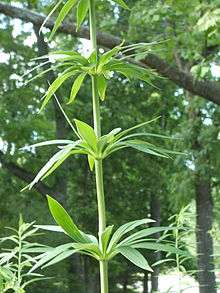Whorl (botany)
In botany, a whorl or verticil is an arrangement of leaves, sepals, petals, stamens, or carpels that radiate from a single point and surround or wrap around the stem or stalk.[1][2] A leaf whorl consists of at least three elements; a pair of opposite leaves is not called a whorl.

The morphology of most flowering plants is based on four types of whorls:
- The calyx: zero or more whorls of sepals at the base
- The corolla: zero or more whorls of petals above the calyx
- The androecium: zero or more whorls of stamens, each comprising a filament and an anther
- The gynoecium: zero or more whorls of carpels, each consisting of an ovary, a style, and a stigma
A flower lacking any of these floral structures is said to be incomplete or imperfect.[3] Not all flowers consist of whorls since the parts may instead be spirally arranged, as in the family Magnoliaceae.
For leaves to grow in whorls is fairly unusual except in plant species with very short internodes. Leaf whorls occur in some trees such as Brabejum stellatifolium and other species in the family Proteaceae (e.g., in the genus Banksia). In plants such as these, crowded internodes within the leaf whorls alternate with long internodes between the whorls.
See also
References
- "whorl". thedictionary. Retrieved 19 August 2012.
- Lindley, John. A Glossary of Technical Terms Used in Botany, p.100, Bradbury and Evans, London, 1848.
- Beentje, H.; Williamson, J. (2010). The Kew Plant Glossary: an Illustrated Dictionary of Plant Terms. Royal Botanic Gardens, Kew: Kew Publishing.